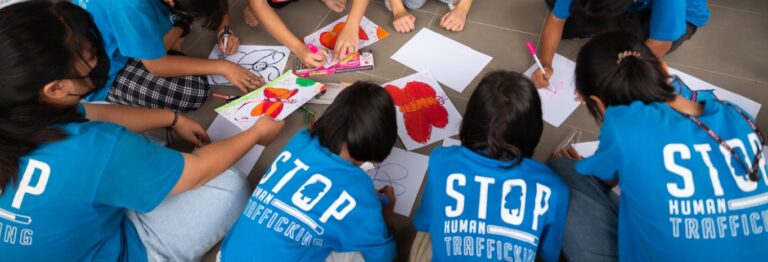Tuesday, March 8 is International Women’s Day! This year, the theme is “Break the Bias” and the call is for us all to help create a world free of bias, stereotypes, and discrimination. This goal is especially important for us, as we continue in our mission to prevent child trafficking. In our experience, discrimination renders marginalized people even more vulnerable to trafficking or makes it harder for them to access help if they have become victims of exploitation.
We’ve talked before about the barriers that stateless people face. We talk about how racial and ethnic discrimination makes people, especially those in poverty, more vulnerable.
For this piece, let’s zoom in on a particular group:
Women Migrant Workers
Imagine a scenario where a young woman you personally know feels completely stuck in her situation. The job market is tight, her mother’s health is on the rocks, and no matter where she looks, nothing in her hometown seems to offer anything they can rely on. But she knows that, if she moves to a different state where the job market is more open, she can find something better to support herself and her family. If she moved to pursue that opportunity, what would you think of her? She is brave? Enterprising? Resilient? Empowered? We don’t have a term for someone in our social class, with the kind of resources most of us have, for someone like her.
But if she lives in a different part of the world, in a lower socioeconomic class, we would call her a migrant worker.
We need a more personable, humanizing term than “migrant worker.” When we hear “migrant worker,” we don’t see their faces or hear their stories, know the hard choices they’ve had to make, or the fears they’ve had to overcome.
Where we work, there was a recent International Labor Organization study about attitudes towards migrant workers. It probably is unsurprising that, contrary to real-world evidence, people tend to believe that migrant workers aren’t needed in the economy, that they can cause crime rates to go up, that they threaten the local culture and heritage, have a poor work ethic, and cannot be trusted.
Naturally, there’s a cost. Here’s a quote from the report:
“Whether migrating through regular or irregular channels, women migrant workers can face the risk of violence and abuse from intermediaries and employers, as well as from partners and others. They experience intersectional forms of discrimination based on multiple identities, including job sector, class, gender, sexual orientation, nationality, legal status, age, pregnancy status, marital status, and language, among others. Women migrant survivors of violence face multiple challenges while seeking justice or accessing essential services. Because of little access to protection and support services, the absence of protection orders, limited referral networks and coordination mechanisms, a lack of language interpreters, and fear of deportation or of losing their jobs, many migrant women suffer in silence.” (Source: ILO)
Most interestingly, the report also seemed to suggest that the more people actually knew migrant workers personally, the more likely they were to feel supportive of them. There is also very strong support for women migrant workers to have access to shelters in the case of violence, and also strong support for law enforcement to act to reduce violence against women migrant workers.
Unfortunately, it’s not uncommon for them to face situations like having their passport or phone confiscated, their freedom of movement restricted, or for them to not receive overtime pay, sick leave, or maternity leave. If these conditions are normalized, they might not even be able to identify when they are victims of trafficking.
What We Do For Migrant Women’s Rights
Our migrant outreach efforts include raising awareness of trafficking, exploitation, and labor rights violations so people are empowered with the knowledge of their rights and what to do when their rights have been violated. In the case of a rights violation, we provide counseling and support in handling it appropriately and sometimes are even able to help authorities process their case.
The women in the migrant communities we work with might be young. Many are mothers with children who need access to school. They might have families to support back home, or they might be striking it out on their own in the hopes of finding something better than they left behind. In their journey to a better life, they are taking on the risk of violence. We’re not waiting for them to experience violence before we offer our support. We believe in preventing such violence towards them and, by extension, their children before it happens.



